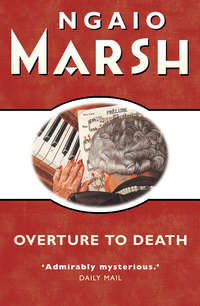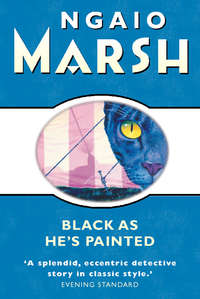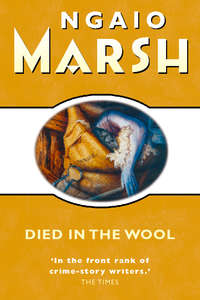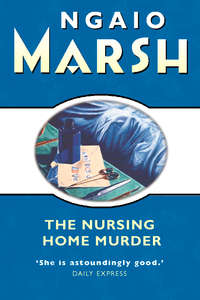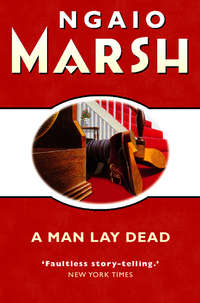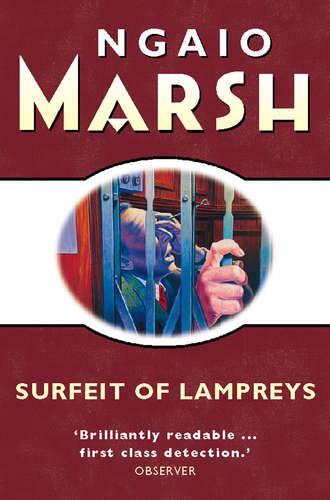
Полная версия
A Surfeit of Lampreys
‘We’re not definitely sunk until Uncle G. has spoken,’ Frid pointed out.
‘Uncle G.!’ Robin exclaimed. ‘I’d almost forgotten about him. He’s always sounded like a myth.’
‘It’s to be hoped he doesn’t behave like one,’ said Henry. ‘He’s coming to see us tomorrow. Daddy has sent him an SOS I can’t tell you how awful he is.’
‘Aunt V. is worse,’ said Frid gloomily. ‘Let’s face it, Aunt V. is worse. And they’re both coming in order to go into a huddle with Daddy and Mummy about finance. We hope to sting Uncle G. for two thousand.’
‘It’ll all come to Daddy when they’re dead, you see, Robin. They’ve no young of their own.’
‘I thought,’ said Roberta, ‘that they were separated.’
‘Oh, they’re always flying apart and coming together again,’ said Frid. ‘They’re together at the moment. Aunt V. has taken up witchcraft.’
‘What!’
‘Witchcraft,’ said Henry. ‘It’s quite true. She’s a witch. She belongs to a little black-magic club somewhere.’
‘I don’t believe you!’
‘You may as well, because it’s true. She started by taking up with a clergyman in Devon who had discovered an evil place on Dartmoor. It seems that he told Aunt V. that he thought he might as well sprinkle some holy water on this evil place but when he went there, the holy water was dashed out of his hands by an unseen power. He lent Aunt V. some books about black magic and instead of being horrified she took the wrong turning and thought it sounded fun. I understand she goes to the black mass and everything.’
‘How can you possibly know?’
‘Her maid, Miss Tinkerton, told Nancy. Tinkerton says Aunt V. is far gone in black magic. They have meetings at Deepacres. The real Deepacres, you know, in Kent. Aunt V. is always buying books about witchcraft, and she’s got a lot of very queer friends. They’ve all got names like Olga and Sonia and Boris. Aunt V. is half-Rumanian, you know,’ said Frid.
‘Half-Hungarian, you mean,’ corrected Henry.
‘Well, all central-European anyway. Her name isn’t Violet at all.’
‘What is it?’ asked Roberta.
‘Something Uncle G. could neither spell nor pronounce so he called her Violet. A thousand years ago he picked her up in Budapest at an embassy. She’s a very sinister sort of woman and quite insane. Probably the witchcraft is a throw-back to a gypsy ancestress of sorts. Of course Uncle G.’s simply furious about it, not being a warlock.’
‘Naturally,’ said Frid. ‘I suppose he’s afraid she might put a spell on him.’
‘I wouldn’t put it past her,’ said Henry. ‘She’s a really evil old thing. She gives me absolute horrors. She’s like a white toad. I’ll bet you anything you like that under her clothes she’s all cold and damp.’
‘Shut up,’ said Frid. ‘All the same I wouldn’t be surprised if you were right. Henry, do let’s stop somewhere and have breakfast. I’m ravenous and I’m sure Robin must be.’
‘It’ll have to be Angelo’s,’ said Henry. ‘He’ll let us chalk it up.’
‘I’ve got some money,’ said Roberta rather shyly.
‘No, no!’ cried Frid. ‘Angelo’s much too dear to pay cash. We’ll put it down to Henry’s account and I’ve got enough for a tip, I think.’
‘It may not be open,’ said Henry. ‘What’s the time? The day seems all peculiar with this early start. Look, Robin, we’re coming into Piccadilly Circus.’
Roberta stared past the chauffeur and, through the windscreen of the car, she had her first sight of Eros.
In the thoughts of those who have never visited them all great cities are represented by symbols; New York by a skyline, Paris by a river and an arch, Vienna by a river and a song, Berlin by a single street. But to British colonials the symbol of London is more homely than any of these. It is a small figure perched slantways above a roundabout, an elegant Victorian god with a Grecian name – Eros of Piccadilly Circus. When they come to London, colonials orientate themselves by Piccadilly Circus. All their adventures start from there. It is under the bow of Eros that to many a colonial has come that first warmth of realization that says to him: ‘This is London.’ It is here at the place which he learns, with a rare touch of insolence, to call the hub of the universe, that the colonial wakes from the trance of arrival, finds his feet on London paving stones, and is suddenly happy.
So it was for Roberta. From the Lampreys’ car she saw the roundabout of Piccadilly, the great sailing buses, the sea of faces, the traffic of the Circus, and she felt a kind of realization stir in her heart.
‘It’s not so very big,’ said Roberta.
‘Quite small, really,’ said Henry.
‘I don’t mean it’s not thrilling,’ said Roberta. ‘It is. I … I feel as if I’d like to be … sort of inside it.’
‘I know,’ agreed Henry. ‘Let’s nip out, Frid, and walk round the corner to Angelo’s.’
He said to the chauffeur: ‘Pick us up in twenty minutes, will you Mayling?’
‘Here’s a jam,’ said Frid. ‘Now’s our chance. Come on.’
Henry opened the door and took Roberta’s hand. She scrambled out. The voyage, the ship, and the sea all slid away into remoteness. A new experience took Roberta and the sounds that are London engulfed her.
CHAPTER 3
Preparation for a Charade
I
The Lampreys lived in two flats which occupied the entire top storey of a building known as Pleasaunce Court Mansions. Pleasaunce Court is merely a short street connecting Cadogan Square with Lennox Gardens and the block of flats stands on the corner. To Roberta the outside seemed forbidding but the entrance hall had lately been redecorated and was more friendly. Pale green walls, a thick carpet, heavy armchairs and an enormous fire gave an impression of light and luxury. The firelight flickered on the chromium steel of a lift-cage in the centre of the hall and on a slotted framework that held the names of the flat owners. Roberta read the top one: ‘No. 25 & 26, Lord and Lady Charles Lamprey. In.’ Henry followed her gaze, crossed quickly to the board and moved a chromium steel tab.
‘“Lord and Lady Charles Lamprey. Out,” I fancy,’ muttered Henry.
‘Oh, are they!’ cried Roberta. ‘Are they away?’
‘No,’ said Henry. ‘Ssh!’
‘Ssh!’ said Frid.
They moved their heads slightly in the direction of the door. A small man wearing a bowler hat stood on the pavement outside and appeared to consult an envelope in his hands. He looked up at the front of the flats and then approached the steps.
‘Into the lift!’ Henry muttered and opened the doors. Roberta in a state of extreme bewilderment entered the lift. A porter, heavily smart in a dark-green uniform and several medals, came out of an office.
‘Hallo, Stamford,’ said Henry. ‘Good morning to you. Mayling’s got some luggage out there in the car.’
‘I’ll attend to it, sir,’ said the porter.
‘Thank you so much,’ murmured the Lampreys politely, and Henry added, ‘his lordship is away this morning, Stamford.’
‘Indeed, sir?’ said the porter. ‘Thank you, sir.’
‘Up we go,’ said Henry.
The porter shut them in, Henry pressed a button, and with a metallic sigh the lift took them to the top of the building.
‘Stamford doesn’t work the lift,’ explained Henry, ‘he’s only for show and to look after the service flats downstairs.’
In three days, photographs of the Pleasaunce Court lift would appear in six illustrated papers and in the files of the criminal investigation department. It would be lit by flash lamps, sealed, dusted with powder, measured and described. It would be discussed by several millions of people. It was about to become famous. To Roberta it seemed very smart and she did not notice that, like the entrance hall, it had been modernized. The old liftman’s apparatus, a handle projecting from a cylindrical casing, was still there but above it was a row of buttons with the Lampreys’ floor, the fourth, at the top. They came out on a well-lit landing with two light green doors numbered 25 and 26. Henry pushed number 25 open and Roberta crossed a threshold into the past. The sensation of Deepacres, of that still-recurrent dream came upon her so poignantly that she caught her breath. Here was the very scent of Deepacres, of the scented oil Lady Charles burnt in the drawing-room, of Turkish cigarettes, of cut flowers and of moss. Our sense of smell works both consciously and subconsciously. About many households is an individual pleasantness of which human noses are only half aware and which is so subtle that it cannot be traced to one source. The Lampreys’ house smell, while it might suggest burning cedarwood, scented oil, and hot-house flowers, was made up of these things and of something more, something that to Roberta seemed the very scent of their characters. It carried her back through four years and, while the pleasure of this experience was still new, she saw in the entrance hall some of their old possessions: a table, a steel engraving, a green Chinese elephant. It was with the strangest feeling of familiarity that she heard Lady Charles’s voice crying:
‘Is that old Robin Grey?’
Roberta ran through the doorway into her arms.
They were all there, in a long white drawing-room with crackling fires at each end and a great gaiety of flowers. Lady Charles, thinner than ever, was not properly up and had bundled herself into a red silk dressing-gown. She wore a net over her grey curls. Her husband stood beside her in his well-remembered morning attitude, a newspaper dangling from his hand, his glass in his eye, and his thin colourless hair brushed across his head. He beamed with pale myopic eyes at Roberta and inclined his head forward with an obedient air, ready for her kiss. The twins, with shining blond heads and solemn smiles, also kissed her. Patch, an overgrown schoolgirl in a puppy-fat condition, nearly knocked her over, and Mike, eleven years old, looked relieved when Roberta merely shook his hand.
‘Such fun, darling,’ said all the Lampreys in their soft voices. ‘Such fun to see you.’
Presently they were all sitting before the fire, with Charlot in her chair, and Henry in his old place on the hearthrug and the twins collapsed on the sofa. Patch hurled herself on to the arm of Robin’s chair, and Frid stood in an elegant attitude before the fire, and Lord Charles wandered vaguely about the room.
‘Dear me,’ said Henry, ‘I feel like Uriah Heep. It’s as good as the chiming of old bellses to see Robin Grey in the flesh.’
The twins murmured agreeably and Colin said: ‘You haven’t grown much.’
‘I know,’ said Roberta. ‘I’m a pygmy.’
‘A nice pygmy,’ said Charlot.
‘Do you think she’s pretty?’ asked Frid. ‘I do.’
‘Not exactly pretty,’ said Stephen. ‘I’d call her attractive.’
‘Really!’ said Lord Charles mildly. ‘Does Robin, who I must say looks delightful, enjoy a public dissection of her charms?’
‘Yes,’ said Roberta. ‘From the family, I do.’
‘Of course she does,’ shouted Patch dealing Roberta a violent buffet across the shoulders.
‘What do you think of me?’ asked Frid, striking an attitude. ‘Aren’t I quite, quite lovely?’
‘Don’t tell her she is,’ said Colin. ‘The girl’s a nymphomaniac.’
‘Darling!’ murmured Lady Charles.
‘My dear Colin,’ said his father, ‘it really would be a good idea if you stick to the words you understand.’
‘Well,’ Frid reasoned, ‘you may thank your lucky stars I am so lovely. After all, looks go a long way on the stage. I may have to keep you all, and in the near future, too.’
‘Apropos,’ said Henry, ‘I fancy there’s a bum downstairs, chaps.’
‘Oh no!’ cried the Lampreys.
‘The signs are ominous. I told Stamford you were out, Daddy.’
‘Then I suppose I’d better stay in,’ muttered Lord Charles. ‘Who can it be this time? Not Smith & Weekly’s again, surely? I wrote them an admirable letter explaining that –’
‘Circumstances over which we had no control,’ suggested Stephen.
‘I put it better than that, Stephen.’
‘Mike,’ said Lady Charles, ‘be an angel and run out on the landing. If you see a little man –’
‘In a bowler,’ said Henry and Frid.
‘Yes, of course in a bowler. If you see him, don’t say anything but just come and tell Mummy, darling, will you?’
‘Right oh,’ said Mike politely. ‘Is he a bum, Mummy?’
‘We think so but it’s nothing to worry about. Do hurry, Mikey, darling.’
Mike grinned disarmingly and began to hop out of the room on one leg.
‘I can hop for miles,’ he said.
‘Well, run quietly for a change.’
Mike gave a Red-Indian call and began to crawl out. The twins rose in a menacing fashion. He uttered a shrill yelp and ran.
‘Isn’t he Heaven?’ Lady Charles asked Roberta.
‘There’s the lift!’ Colin ejaculated.
‘It’ll only be Mike t-taking a run down and up,’ said Stephen. ‘I understand that Mike’s playing with the lift is rather unpopular.’
‘I bet it’s the bum,’ said Colin. ‘Has Baskett been warned? I mean he may just lavishly show him in.’
‘If Baskett doesn’t know a bailiff’s man,’ said Lord Charles warmly, ‘after having lived with us for fifteen years, he is a stupider fellow than I take him for.’
‘There’s the bell!’ cried Lady Charles.
‘It’s all right,’ said Henry. ‘It’ll only be Robin’s luggage.’
‘Thank Heaven! Robin, darling, you’d like to see your room, wouldn’t you? Frid, darling, show Robin her room. It’s too tiny and absurd, darling, but you won’t mind, will you? Actually it was meant for a hall, but Mike and Patch turned it into a sort of railway station, so we’re delighted to have it made sane again. I really must dress myself but I can’t resist waiting to hear the worst about the bum.’
‘Here’s Mike,’ said Frid.
Mike came back, still hopping on one leg, and singing:
‘Hallelujah, I’m a bum!
Hallelujah, bum again!
Hallelujah, give us a hand up to –’
‘Shut up,’ said Stephen and Colin. ‘What do you mean? Is he there?’
‘Nope,’ whispered Mike. ‘Only her luggage.’
‘Don’t say “her”,’ said Stephen.
Mike began to hop up and down in front of the twins singing:
‘Two, two the lily white boys
Clothed all in green, oh.’
Colin took him by the shoulders and Stephen seized his heels. They swung him to and fro and flung him, screaming with pleasure, on the sofa.
‘Lily white boys!’ yelled Mike. ‘I bet she doesn’t know which is which. Do you?’ He looked engagingly at Roberta.
‘Do you – Robin?’
The twins turned to her, and raised their eyebrows.
‘Do you?’ they asked.
‘I do when you speak,’ said Roberta.
‘I hardly stammer at all, now,’ said Stephen.
‘I know, but your voices are different, Stephen. And even if you didn’t speak I’d only have to look behind your ears.’
‘Oh,’ said Mike, ‘it’s not fair. She knows the secret. Stephen’s old mole. Old moledy Stephen doesn’t wash behind his ears, yah, yah, yah!’
‘Let’s go to your room,’ said Frid. ‘Mike’s turning mad dog, and the scare seems to be over.’
II
Roberta liked her room which was in 26. As Lady Charles had told her it was really the entrance hall but a heavy curtain had been hung across it making a passage, through which the others would have to go to reach the real passage and their bedrooms. Frid showed her the rest of 26 which was all bedrooms with Nanny Burnaby living in the ex-kitchen where she could make the cups of Ovaltine that she still forced the Lampreys to drink before they went to bed. Nanny was sitting by the electric stove which she had converted into a sort of bureau. Her hair had turned much greyer. Her face was netted over with lines as if, thought Roberta, each good or ill deed of the young Lampreys had left its sign on that one face alone. She had been playing patience and received Roberta exactly as if four days instead of four years had gone by since their last meeting.
‘Nanny,’ said Frid, ‘things are gloomy. We’re up the spout again and there’s liable to be a bum at any moment.’
‘Some folk will do anything,’ said Nanny darkly.
‘Well, I know, but I suppose they rather want their money.’
‘Well, his lordship had better pay them and be done with it.’
‘I’m afraid we haven’t got any money at the moment, Nan.’
‘Nonsense,’ said Nanny.
She looked at Roberta and said, ‘You don’t grow much, Miss Robin.’
‘No, Nanny. I rather think I’ve finished. I’m twenty now, you know.’
‘Same age as Miss Frid and look how she’s shot up. You need nourishing.’
‘Nan,’ said Frid. ‘Uncle Gabriel’s coming tomorrow.’
‘Hm’m,’ said Nanny.
‘We hope he’ll pull us out of the soup.’
‘So he ought to with his own flesh and blood in need.’
Henry looked in at the door. By the singular scowl Nanny gave him, Roberta saw that he was still the favourite.
‘Hallo, Mrs Burnaby,’ he said. ‘Have you heard the news? We’re in the soup.’
‘It’s not the first time, Mr Henry, and it won’t be the last. His lordship’s brother will have to attend to it.’
Henry looked fixedly at his old nurse. ‘If he doesn’t,’ he said, ‘I think we’ll really go bust.’
Nanny’s hands, big-jointed with rheumatism, made a quick involuntary movement.
‘You’ll be all right, Nan,’ added Henry. ‘We fixed you up with an annuity, didn’t we?’
‘I’m not thinking of that, Mr Henry.’
‘No. No, I don’t suppose you are. I was, though.’
Nanny put on a pair of thick-lens spectacles and advanced upon Henry.
‘You put your tongue out,’ she ordered.
‘Why on earth?’
‘Do as you’re told, Mr Henry.’
Henry put out his tongue.
‘I thought so. Come to me before you go to bed this evening. You’re bilious.’
‘What utter rot.’
‘You’ve always shown your liver in your spirits.’
‘Nanny!’
‘Talking a lot of rubbish about matters that are beyond your understanding. His other lordship will soon send certain people about their business.’
‘Meaning us?’
‘Stuff and nonsense. You know what I mean. Miss Robin, you’d better take a glass of milk with your lunch. You’re over-excited.’
‘Yes, Nanny,’ said Roberta.
Nanny returned to her game of patience.
‘The audience is over,’ said Henry.
‘I’d better unpack,’ said Roberta.
‘Leave out your pressings,’ said Nanny. ‘I’ll do ’em.’
‘Thank you, Nanny,’ said Roberta and went to her room.
Now she was alone. The floor beneath her feet seemed unstable as though the sea, after five weeks’ domination, was not easily to be forgotten. It was strange to feel this physical reminder of an experience already so remote. Roberta unpacked. The clothes that she had bought in New Zealand no longer pleased her but she was too much preoccupied by the affairs of the Lampreys to be much concerned with her own. During the last four years Roberta had passed through adolescence into womanhood. The emotional phases proper to those years had been interrupted by tragedy. Two months ago when the languors and propulsions of adolescence had not yet quite abated, Roberta’s parents had been killed, and a kind of frost had closed about her emotions so that at first, though she felt the pain of her loss, it was with her reason rather than with her heart. Later, when the thaw came, she found that something unexpected had happened to her. Her affections, which had been easily and lightly bestowed, had crystallized, and she found herself indifferent to the greater number of her friends. With this discovery came another; that in four years her heart was still with an incredible family now half the world away. Her thought returned to Deepacres and she wanted the Lampreys. More than any one else in the world she wanted them. They might be scatter-brained, unstable, reprehensible, but they suited Roberta and she supposed she suited them. When her father’s sister wrote to suggest that Roberta should come to England and live with her, Roberta was glad to go because, by the same mail, came a letter from Lady Charles Lamprey that awoke all her old love for the family. When it became certain that she would see them again she grew apprehensive lest they should find her an awkward carryover from their colonial days, but as soon as she saw Henry and Frid on the wharf she had felt safer, and now, as she put the last of her un-smart garments in a drawer that already contained several pieces of a toy railway, she was visited by the odd idea that it was she who had grown so much older and that the young Lampreys had merely grown taller.
‘Otherwise,’ thought Roberta, ‘they haven’t changed a bit.’
The door opened and Lady Charles came in. She was now dressed. Her grey hair shone in a mass of small curls, her thin face was delicately powdered, and she looked and smelt delightful.
‘How’s old Robin Grey?’ she asked.
‘Very happy.’
Lady Charles turned on the electric heater, drew up a chair, sat in it, folded her short skirt back over her knees and lit a cigarette. Roberta recognized, with a warm sense of familiarity, the signs of an impending gossip.
‘I hope you won’t be too uncomfortable, darling,’ said Lady Charles.
‘I’m in Heaven, Charlot, darling.’
‘We do so wish we could have you for a long time. What are your plans?’
‘Well,’ said Roberta, ‘my aunt has offered very nicely to have me as a sort of companion, but I think I want a job, a real job, I mean. So if she agrees, I’m going to try for a secretaryship in a shop, or failing that, an office. I’ve learnt shorthand and typing.’
‘We must see what we can do. But of course you must have some fun first.’
‘I’d love some fun but I’ve only got a tiny bit of money. About £200 a year. So I’ve got to start soon.’
‘I must say I do think money’s awful,’ said Lady Charles. ‘Here are we, practically playing mouth-organs and selling matches, and all because poor darling Charlie doesn’t happen to have a head for sums. I’m so dreadfully worried, Robin. It’s so hard for the children.’
‘Hard for you, too.’
‘Well, if we go bankrupt it’ll be rather uncomfortable. Charlie won’t be allowed on a racecourse for one thing. There’s one comfort, he has paid his bookmaker. There’s something so second-rate about not paying your bookmaker and the things they do to you are too shaming.’
‘What sort of things?’
‘I think they call out your name at Sandown and beat with a hammer to draw everybody’s attention. Or is that only if you are a mason? At any rate we needn’t dwell on it because it’s almost the only thing that is not likely to happen to us.’
‘But, Charlot, you’ve got over other fences.’
‘Nothing like this. This isn’t a fence; it’s a mountain.’
‘How did it all happen?’
‘My dear, how does one run into debt? It simply occurs, bit by bit. And you know, Robin, I have made such enormous efforts. We’ve lived like anchorites and put down one thing after another. The children have been wonderful about it. The twins and Henry have answered any number of advertisements and have never given up the idea that they must get a job. And they’ve been so good about their fun, enjoying quite cheap things like driving about England and staying at second-rate hotels and going to Ostend for a little cheap gamble instead of the Riviera where all their friends are. And Frid was so good-natured about her coming-out. No ball; only dinner and cocktail parties which we ran on sixpence. And now she’s going to this drama school and working so hard with the most appalling people. Of course the whole thing is the business of Charlie and the jewels. Don’t ask me to tell you the complete story, it’s too grim and involved for words to convey. The gist of it is that poor Charlie was to have this office in the City with buyers in the East and at places like the Galle Face Hotel at Colombo. He was in partnership with a Sir David Stein, who seemed a rather nice second-rate little man, we thought. Well, it appears that they had a great orgy of paper-signing and no sooner was that over than Sir David blew out his brains.’


